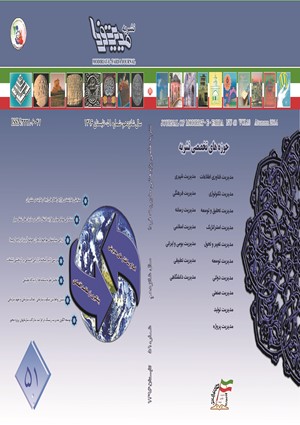تبیین مدل توسعه منابع انسانی مبتنی بر الگوی اسلامی ـ ایرانی پیشرفت
محورهای موضوعی :وحید ناصحی فر 1 , سعید عسکری ماسوله 2
1 - دانشگاه علامه طباطبائی، تهران
2 - علامه طباطبائی تهران
کلید واژه: توسعه منابع انسانی, الگوی اسلامی ـ ایرانی پیشرفت, تحلیل عاملی تاییدی.,
چکیده مقاله :
این تحقیق با هدف تبیین مدل توسعه منابع انسانی مبتنی بر الگوی اسلامی ـ ایرانی پیشرفت در راستای استخراج مدل تعمیم یافته در وزارتخانه های منتخب ایران انجام شد. روش تحقیق از نوع توصیفی ـ پیمایشی و برگرفته از داده های مقطعی است. سوالات تحقیق توصیفی و فرضیات آن از نوع رابطی است. سوال اصلی تحقیق در برگیرنده چگونگی الگوی یکپارچه توسعه منابع انسانی مبتنی بر الگوی اسلامی ایرانی پیشرفت در وزارتخانه های جمهوری اسلامی ایران است. برای آزمون فرضیات از آزمون میانگین جامعه و برای اولویتبندی متغیرها از آزمون فریدمن استفاده شد. سیزده فرضیه بر اساس مدلهای تحقیقات گذشته تعریف شد. جامعه آماري در تحقيق در برگيرنده کليه معاونان و مديران توسعه منابع انسانی وزارتخانههای دولتی منتخب که در سال منتهي به 1395 در حال اشتغال هستند را شامل مي شود. نتایج آزمون فرضیات تحقیق نشانگر تایید تمام متغیرهای موثر بر مدل تحقیق بود. با توجه به نتایج تحلیل عاملی تاییدی از دیدگاه سازمانی فاکتورهای عدالت سازمانی، عوامل فراسازمانی، آموزش، عوامل سخت افزاری محیط کاری، بومی بودن مدل، مدیریت دانش، عوامل ملی و عوامل نرم افزاری محیط کاری، و از دیدگاه فردی دین محوری و تعهد کارکنان در توسعه منابع انسانی با رویکرد اسلامی ایرانی پیشرفت موثراند. در نهایت، با استفاده از تحلیل عاملی تاییدی مدل نهایی تحقیق استخراج و برازش آن مورد تایید قرار گرفت.
This study seeks to explain human resource development models based on Islamic-Iranian model of progress in line with a generalized model in the selective ministries of Iran. The research method is descriptive-survey and is based on cross-sectional data. The questions are descriptive and hypotheses are relational. The main question of the research involves how the integrated model of development of human resources based on Islamic-Iranian model of progress in the ministries of Iran is. The population mean test was used to test the hypotheses and Friedman test was used to prioritize variables. Thirteen hypotheses were defined based on the models of previous studies. The population of the study includes all vice presidents and directors of human resources development who are at service for the year ended in 1395 in the selected governmental ministries. The findings of the hypotheses testing indicate the confirmation of all the variables influencing the research model. According to the results of the confirmatory factor analysis, from the organizational perspective factors like organizational justice, cross-organizational factors, training, hardware factors of the working environment, indigenousness of the model, knowledge management, national factors and software factors of the working environment and from individual perspective factors like faith-centeredness and engagement of the employees are effective on the development of human resources based on Islamic-Iranian approach of progress. Finally, the final version of the research model extracted by using confirmatory factor analysis and its fitting was approved.
